ARTICLE AD BOX
There is a 1990s billboard advert, fondly remembered in both England and France.
The background is a St George's cross - "1966 was a great year for English football," the text begins.
"Eric was born," it concludes, as Manchester United maverick Cantona stares out moodily from the foreground.
As France's Grand Slam's winners danced amid the tickertape, pyro and thumping Eurodisco, it bears updating - 1998 was a great year for French sport, Cameron was born.
- France sweep aside England to secure Grand Slam
- I haven't done a good enough job - Eddie Jones
- Vive Les Bleus - Rugby Union Weekly from the Stade de France
Second row Cameron Woki was right in the heart of the post-match mosh-pit after Saturday's Grand Slam-sealing win over England. Just as he has been at the heart of everything else for France during this Six Nations.
The 23-year-old is the archetypal modern forward, all long limbs, deft hands and bottomless energy.
He was born in Saint Denis, in the shadow of the national stadium, four months after another France team had cavorted around the pitch, soaking up the champagne and adulation.
Back in 1998, it was Zidane, Desailly, Barthez and the rest. A football team who coined a term - black-blanc-beur - to sum up its cosmopolitan mix.
That year, they lit up the Arc de Triomphe in honour of their World Cup win. A million people swarmed the Champs Elysees to celebrate.
It wasn't quite that on the final whistle this time. Not yet. But, as the car horns blared deep into the night and the songs spilled across the concourse and out into the streets, the spirit felt the same.
In 18 months' time France will host rugby union's 2023 World Cup. And this Paris spring feels like the moment a public fell head over heels for its national team.
It had been building all day ahead of a 21:00 kick-off local time.
On the morning newsstands, L'Equipe's headline was 'Operation Grand Slam', with its lead writer imploring the class of 2022 to end a wait for a Six Nations clean sweep that had stretched like an eternity since their last in 2010.
The lunchtime television schedules featured a behind-the-scenes documentary on the team's journey to the brink of glory.
Three hours before kick-off, queues of fans snaked from the entrance gates.
The wait was worth it. France shone under the lights. They were quicker in mind and muscle than England. They bristled with menace and cunning whenever space opened up. They could, perhaps should, have scored more than their three tries. The final pass didn't always go to hand, the wrong option was sometimes taken.
But, they were so many streets ahead of their opposition, they didn't have to be perfect. England, faced with a defence forged by Englishman Shaun Edwards, formerly defence coach of Wales, ran short of ideas, even if they never lost heart.
There was one moment towards the end of the first half, when Henry Slade went on a sortie down the blind-side, found himself outnumbered and, for the want of a better plan, charged into contact.
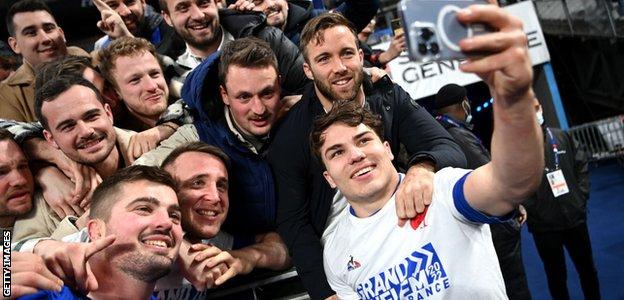 Gregory Alldritt and Antoine Dupont share selfies with fans after the final whistle
Gregory Alldritt and Antoine Dupont share selfies with fans after the final whistleThe tidal wave of blue-shirted defenders duly swallowed him up and spat him out.
The game was all but over just after the hour. Dupont, a bundle of fast-twitch fibres and even faster brain, left English tacklers clawing at his coattails as he danced under the posts.
The win puts France second in the world rankings, leap-frogging New Zealand, who they beat on another electrifying night, back in November.
That victory over the All Blacks is part of an eight-Test winning hot streak. Given the only team above them in the standings - world champions South Africa - have lost four of their past seven games, France can claim to be the real kingpins of the international game.
They certainly have its best player. Captain Dupont was voted World Player of the Year in December and his standards remain stratospheric.
Born into a farming family, in a rugby hotbed in the south of the country, he has followed a well-trodden traditional route to the national team.
He's the obvious face of this French side. But, like the 1998 World Cup winners, there is more than one face in the foreground, more than one story in the background.
Woki, prop Demba Bamba and centre Jonathan Danty, have taken a shorter, but less-travelled road, from Paris' high-rise suburbs to the Stade de France.
Wing Gabin Villiere, from Normandy in north west France, played sevens in his past. Full-back Melvyn Jaminet played second tier.
Damian Penaud and Romain Ntamack are following in the footsteps of their fathers, both French internationals.
Paul Willemse and Uini Atonio have left the lands of their forefathers, arriving in France and the team from South Africa and South Auckland respectively.
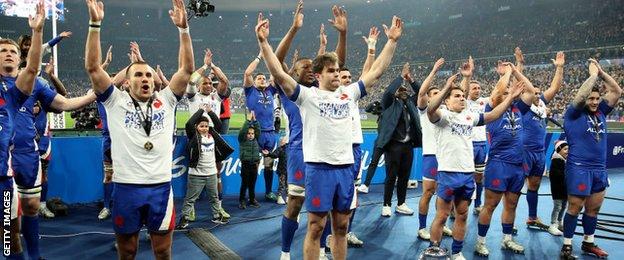 France and their fans recreate the Viking thunderclap
France and their fans recreate the Viking thunderclapThey were all there as the Tannoy volume dipped on the on-pitch celebrations. When the team jumped over the advertising hoardings and invoked memories of another piece of Stade de France's football past.
Together they faced their fans, and like Iceland at Euro 2016, they celebrated by clapping high over their heads. Slow at fast. And then faster and faster. But always together, as one.
That unity, that diversity is driving this France team towards 2023 and a shot at even greater history. Right now, they are not missing anything.

 2 years ago
23
2 years ago
23
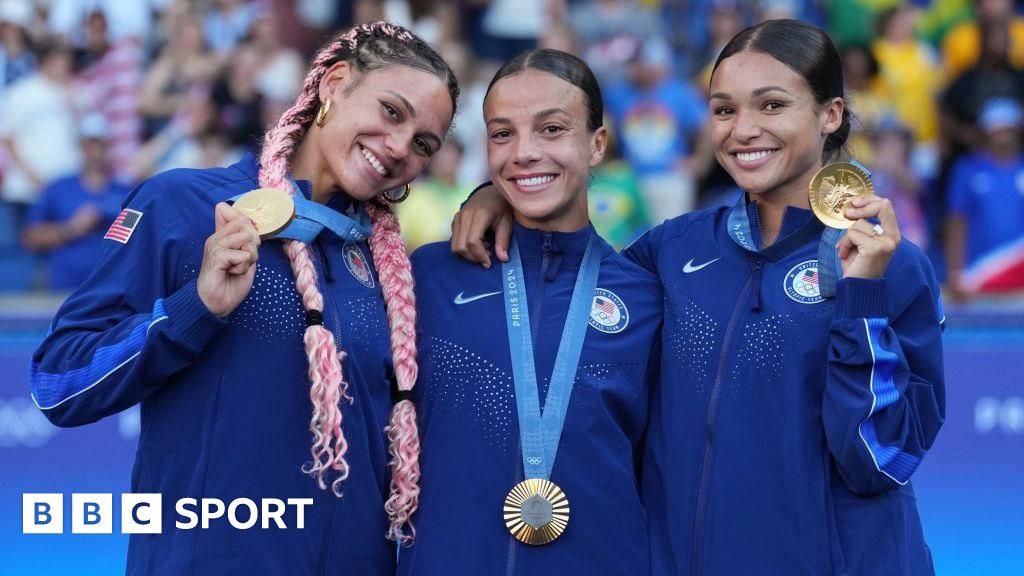
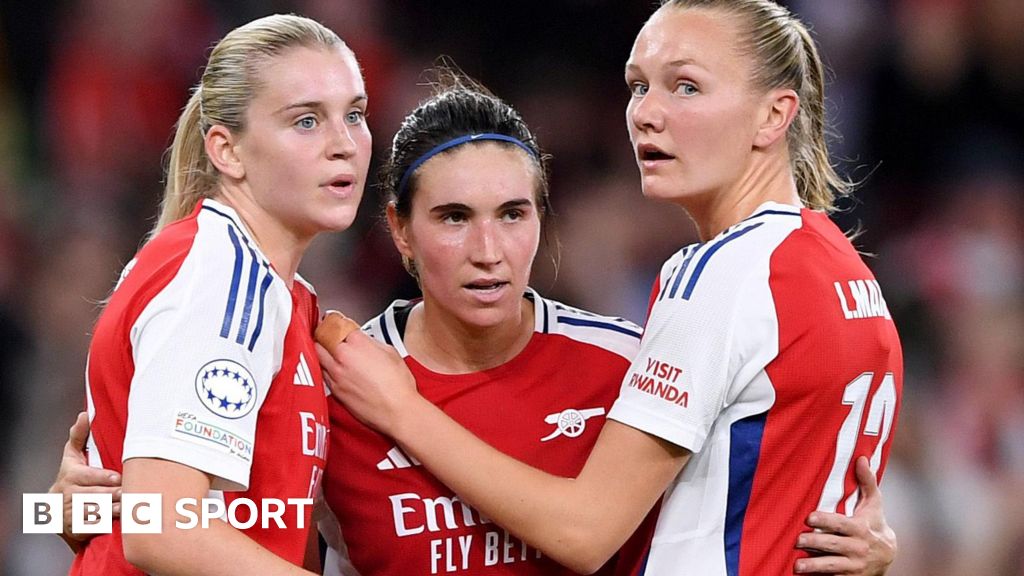
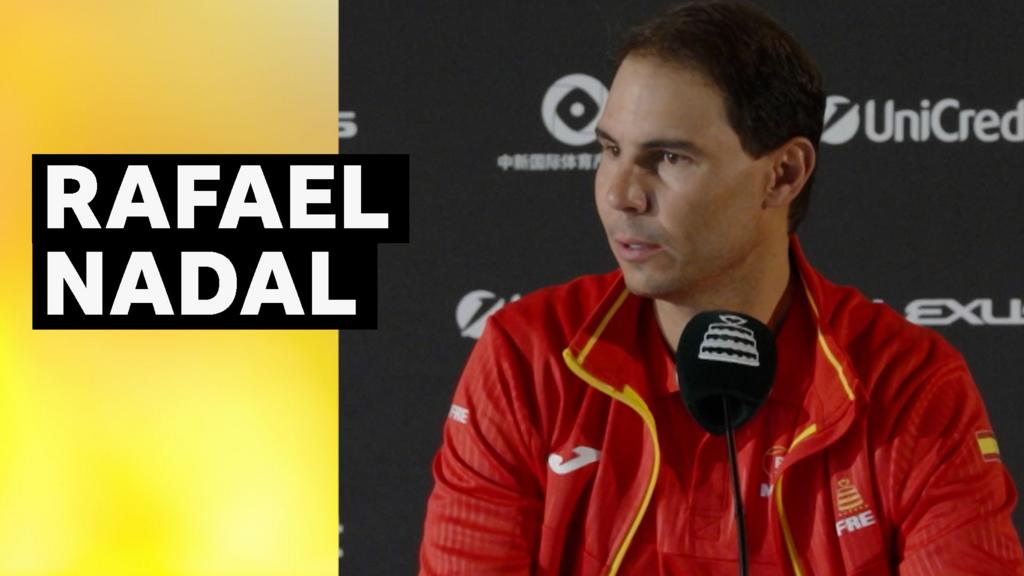





 English (US)
English (US)